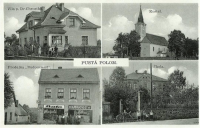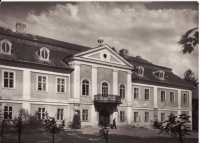A bomb destroyed a part of their house at the end of the war. The father lost an eye
Stáhnout obrázek
Josef Vaněk was born in Pustá Polom on 25 March 1934. His family owned a small farm. Both of his grandfathers worked at Count Friedrich Stolberg‘s castle in the nearby Kyjovice. Josef Vaněk witnessed war events as a child - the arrival of the Nazi troops in 1938 and the frontline passing through their village during the Ostrava-Opava Operation in the spring of 1945. After the war, his family repaired the damaged house and restored a disturbed field. In the wake of 1948, they faced ever-increasing pressure from authorities for compulsory crops and food levies. When a farming cooperative was established in Pustá Polom, they finally lost their land and livestock. Josef Vaněk had to work as a labourer in a sheet metal rolling mill in Ostrava-Vítkovice. He stayed in the steel industry until retirement. He was deeply saddened to watch the landscape near his native village transforming and the Czech farming industry declining both before and after 1989. He got married in 1956. He has two children and they lived in a detached house in Pustá Polom in 2019.

